Hyaluronic acid is a popular ingredient in skincare products for its hydrating and anti-aging properties. When used correctly, it can help improve the overall texture and appearance of your skin. Here are some expert tips on how to use hyaluronic acid serum with moisturizer for the best results:
-
Start with clean skin: Before applying any skincare products, make sure your face is clean and free of makeup, dirt, and oil. Use a gentle cleanser and pat your skin dry.
-
Apply hyaluronic acid serum: Take a small amount of hyaluronic acid serum and gently apply it all over your face and neck. You can use your fingertips or a clean cotton pad for application.
-
Wait for the serum to absorb: Give the serum some time to absorb into your skin. This usually takes a few minutes. You'll know the serum has been absorbed when your skin feels soft and smooth.
-
Apply moisturizer: Once the serum has been absorbed, apply your moisturizer on top of it. This will help lock in the hydration from the serum and provide additional moisture to your skin.
-
Don't overdo it: It's important not to overuse hyaluronic acid serum as it can cause dryness or irritation. Start by using it once a day and gradually increase the frequency if needed. You can also alternate between using it in the morning and evening.
-
Use sunscreen: Hyaluronic acid serum can make your skin more sensitive to the sun, so it's essential to use sunscreen daily. Look for a broad-spectrum sunscreen with an SPF of at least 30 and apply it generously.
By following these expert tips, you can effectively use hyaluronic acid serum with moisturizer for the best results. Remember to be consistent with your skincare routine and listen to your skin's needs. If you have any concerns, consult with a dermatologist for personalized advice.
Understanding Hyaluronic Acid Serum

Hyaluronic acid is a naturally occurring molecule found in the body, particularly in the skin, connective tissues, and eyes. It is known for its ability to retain moisture, which makes it an important ingredient in many skincare products, including serums.
A hyaluronic acid serum is a skincare product that contains a concentrated amount of hyaluronic acid. When applied topically, the serum penetrates the skin and delivers a boost of hydration, helping to plump up the skin and reduce the appearance of fine lines and wrinkles.
In addition to its hydrating properties, hyaluronic acid has anti-inflammatory properties, which can help to soothe and calm the skin. It is also believed to stimulate collagen production, which can improve skin elasticity and firmness.
Hyaluronic acid serums are typically lightweight and easily absorbed, making them suitable for all skin types. They can be used alone or as part of a larger skincare routine, depending on the individual's needs and preferences.
It is important to note that while hyaluronic acid is generally considered safe and well-tolerated, some people may experience mild irritation or allergic reactions. It is always a good idea to patch test a new skincare product before applying it to the entire face.
Hyaluronic Acid Serum Benefits
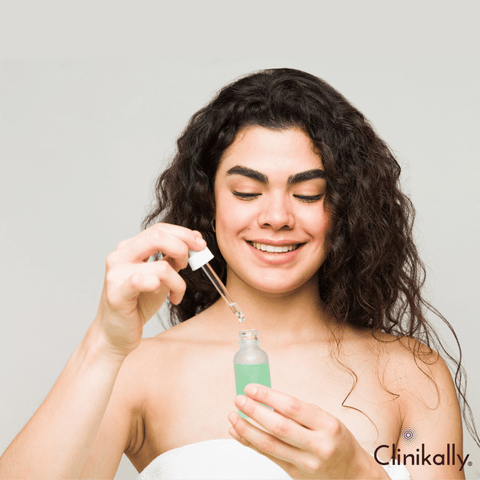
Hyaluronic acid (HA) serum is a popular skincare product that offers a range of benefits for the skin. Here are some of the top benefits:
-
Hydration: Hyaluronic acid is a natural humectant that can hold up to 1000 times its weight in water, making it an excellent moisturizer. It helps to hydrate and plump the skin, reducing the appearance of fine lines and wrinkles.
-
Anti-aging: As we age, the production of hyaluronic acid in our skin decreases, leading to dryness, sagging, and wrinkles. Using a hyaluronic acid serum can help to restore the skin's moisture barrier and improve elasticity, making it appear smoother and more youthful.
-
Soothing: HA has anti-inflammatory properties that can help to calm and soothe irritated or sensitive skin. It can also reduce redness and improve the appearance of skin conditions like eczema and rosacea.
-
Brightening: HA can improve the overall texture and tone of the skin, reducing the appearance of dark spots and hyperpigmentation. It can also help to boost radiance and give the skin a healthy glow.
-
Lightweight: HA serum is typically lightweight and absorbs quickly into the skin, making it an excellent choice for all skin types, including oily and acne-prone skin.
Overall, incorporating a hyaluronic acid serum into your skincare routine can provide numerous benefits for your skin's health and appearance.
Hyaluronic Acid Serum for Different Skin Types
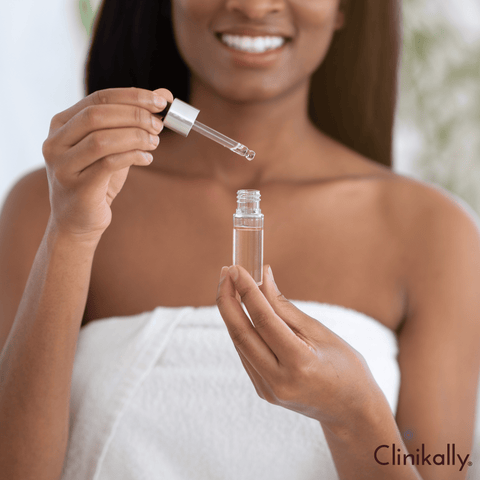
Hyaluronic acid serum is a popular skincare ingredient that has hydrating and anti-aging properties. It works by drawing moisture into the skin, improving skin texture, and reducing the appearance of fine lines and wrinkles. However, not all hyaluronic acid serums are created equal, and some may be more suitable for certain skin types than others. Here are some general guidelines for choosing a hyaluronic acid serum for different skin types:
-
Dry skin: Look for a hyaluronic acid serum with a higher concentration of hyaluronic acid. A serum with a concentration of 1% or higher will be more effective in hydrating dry skin. Additionally, look for a serum that contains other hydrating ingredients like glycerin, ceramides, or fatty acids.
-
Oily skin: Choose a lightweight hyaluronic acid serum that won't clog your pores. Look for a serum that is oil-free and non-comedogenic. A serum that contains niacinamide can also be helpful for oily skin as it can regulate sebum production.
-
Combination skin: Look for a hyaluronic acid serum that balances hydration without leaving an oily residue. A serum that contains both high and low molecular weight hyaluronic acid will penetrate the skin at different depths, providing hydration to all layers of the skin.
-
Sensitive skin: Choose a hyaluronic acid serum that is fragrance-free, alcohol-free, and contains no other potential irritants. A serum with a lower concentration of hyaluronic acid may be gentler on sensitive skin.
-
Aging skin: Look for a hyaluronic acid serum that contains other anti-aging ingredients like vitamin C, retinol, or peptides. These ingredients can work together to improve skin texture, reduce fine lines and wrinkles, and improve overall skin tone and radiance.
Remember that everyone's skin is unique, so it's essential to pay attention to how your skin responds to different products. Start by patch testing any new serum on a small area of your skin before applying it all over your face.
How to Use Hyaluronic Acid Serum
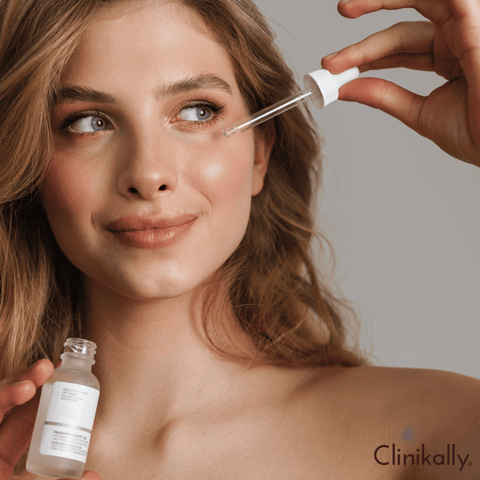
Hyaluronic acid serum is a popular skincare product that can help to hydrate and plump the skin. Here are some steps on how to use hyaluronic acid serum:
-
Start with a clean face: Wash your face with a gentle cleanser and pat it dry with a clean towel.
-
Apply the serum: Take a small amount of hyaluronic acid serum on your fingertips and gently massage it into your skin. You can apply it to your face, neck, and chest area.
-
Let it absorb: Allow the serum to fully absorb into your skin before applying any other skincare products or makeup. This usually takes a few minutes.
-
Follow up with a moisturizer: Hyaluronic acid serum works best when it is followed up with a moisturizer. Apply a moisturizer that is appropriate for your skin type to lock in the hydration.
-
Use it regularly: For best results, use hyaluronic acid serum regularly. You can use it once or twice a day, depending on your skincare routine.
It's important to note that hyaluronic acid serum may not be suitable for everyone. If you have sensitive skin or are prone to breakouts, it's best to consult with a dermatologist before adding it to your skincare routine.
Hyaluronic Acid Serum Before and After

Hyaluronic acid is a popular skincare ingredient that is known for its ability to hydrate and plump the skin. Hyaluronic acid serum is a product that contains a concentrated amount of hyaluronic acid and is designed to be applied to the skin for maximum hydration.
Before using a hyaluronic acid serum, the skin may appear dull, dry, and lacklustre. Fine lines and wrinkles may also be more noticeable due to dehydration. However, after using a hyaluronic acid serum, the skin should appear more hydrated, plump, and youthful.
The effects of using a hyaluronic acid serum can vary depending on the individual and the quality of the product. Some people may notice a difference in their skin immediately after using the serum, while others may need to use the product consistently for several weeks before seeing results.
Overall, incorporating a hyaluronic acid serum into your skincare routine can be a great way to hydrate and rejuvenate your skin, leading to a healthier, more youthful-looking complexion.
Hyaluronic Acid Serum Side Effects

Hyaluronic acid serum is generally considered safe and well-tolerated by most people. However, like any skincare product, it may cause side effects in some individuals. Here are some potential side effects of hyaluronic acid serum:
-
Skin irritation: In some cases, hyaluronic acid serum may cause skin irritation, such as redness, itching, or rash.
-
Breakouts: Some people may experience breakouts or acne when using hyaluronic acid serum. This is because the serum can increase moisture levels in the skin, which can lead to clogged pores and acne.
-
Allergic reaction: Although rare, some people may be allergic to hyaluronic acid and experience an allergic reaction, such as swelling, hives, or difficulty breathing.
-
Headaches: Some people may experience headaches when using hyaluronic acid serum. This is likely due to the increased hydration of the skin, which can lead to changes in blood flow and pressure.
It's important to note that these side effects are not common, and most people can use hyaluronic acid serum without any issues. If you experience any of these side effects, stop using the product and consult your healthcare provider.
Hyaluronic Acid Serum Ingredients
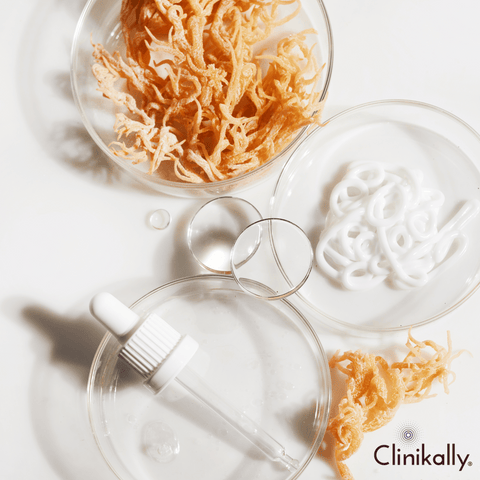
Hyaluronic acid serum typically contains a few key ingredients that work together to provide hydration and other benefits to the skin. Here are some common ingredients found in hyaluronic acid serum:
-
Hyaluronic acid: This is the star ingredient in hyaluronic acid serum. It is a naturally occurring substance in the skin that helps to retain moisture, improve skin texture and elasticity, and reduce the appearance of fine lines and wrinkles.
-
Water: Hyaluronic acid serum is often water-based, so water is a key ingredient in the formula. It helps to deliver the hyaluronic acid and other active ingredients deep into the skin.
-
Glycerin: This is a humectant that helps to draw moisture to the skin, making it feel soft and smooth.
-
Panthenol: Also known as vitamin B5, panthenol is a moisturizing agent that helps to improve the skin barrier and reduce inflammation.
-
Allantoin: Allantoin is a soothing ingredient that helps to calm irritated skin and reduce redness.
-
Aloe vera: This plant extract has anti-inflammatory and moisturizing properties that can help to soothe and hydrate the skin.
-
Vitamin C: This antioxidant helps to brighten the skin and reduce the appearance of dark spots and discoloration.
-
Vitamin E: This antioxidant helps to protect the skin from environmental damage and improve skin texture and tone.
It's important to note that the specific ingredients in a hyaluronic acid serum can vary depending on the brand and formulation. Always check the ingredients list before using a new skincare product, especially if you have any allergies or sensitivities.
Hyaluronic Acid Serum for Acne
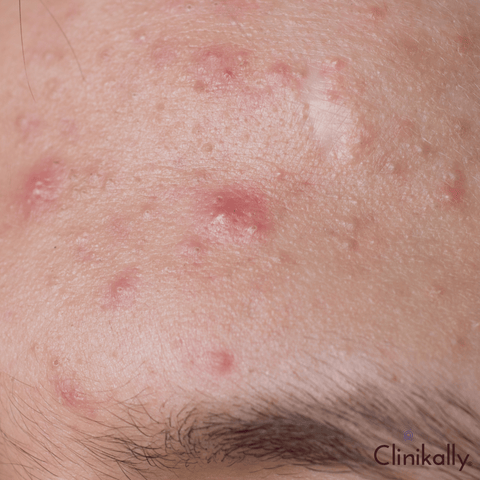
Hyaluronic acid is a popular ingredient in skincare products due to its ability to hydrate the skin and improve its texture. However, when it comes to treating acne specifically, hyaluronic acid may not be the most effective solution on its own.
Acne is caused by a combination of factors, including excess oil production, clogged pores, and bacterial overgrowth. While hyaluronic acid can help to hydrate and soothe the skin, it does not directly address these underlying causes of acne.
That being said, using a hyaluronic acid serum as part of a comprehensive acne treatment regimen can still be beneficial. By keeping the skin moisturized and nourished, hyaluronic acid can help to reduce inflammation and prevent further breakouts.
To effectively treat acne, it is also important to incorporate other acne-fighting ingredients such as salicylic acid or benzoyl peroxide into your skincare routine. Consult with a dermatologist or skincare professional to determine the best products and regimen for your individual skin type and acne severity.
Hyaluronic Acid Serum vs Vitamin C Serum
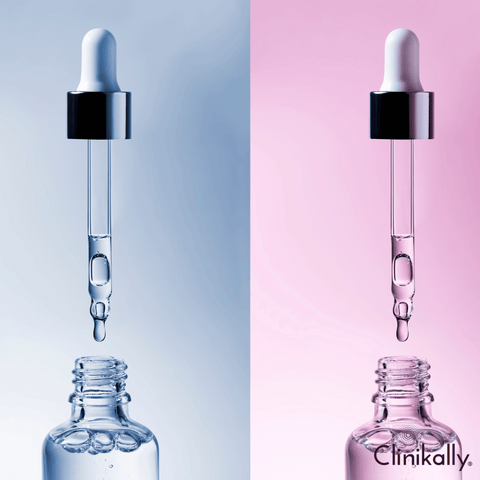
Hyaluronic acid serum and vitamin C serum are both popular skincare products that offer different benefits for the skin.
Hyaluronic acid is a natural substance that is found in the skin and helps to keep it hydrated and plump. When used in a serum form, hyaluronic acid can help to improve the skin's moisture levels and reduce the appearance of fine lines and wrinkles. It is especially beneficial for those with dry or dehydrated skin.
Vitamin C, on the other hand, is a powerful antioxidant that can help to protect the skin from free radical damage caused by sun exposure and pollution. When used in a serum form, vitamin C can also help to brighten the skin and reduce the appearance of dark spots and hyperpigmentation. It is especially beneficial for those with dull or uneven skin tone.
In general, hyaluronic acid serum is best for those who are looking to improve their skin's hydration and reduce the appearance of fine lines and wrinkles, while vitamin C serum is best for those who are looking to protect their skin from environmental damage and improve their skin's radiance.
However, both hyaluronic acid and vitamin C can be beneficial for the skin, so it is possible to use both serums in your skincare routine. It is important to note that some skin types may be sensitive to vitamin C, so it is best to start with a lower concentration and gradually increase it over time. As always, it is recommended to consult with a dermatologist or skincare professional to determine the best products and regimen for your individual skin type and concerns.
Hyaluronic Acid Serum for Wrinkles
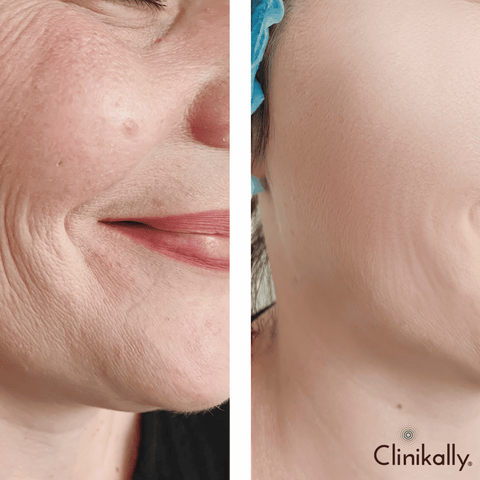
Hyaluronic acid serum is a popular skincare product that has been known to help with wrinkles. Hyaluronic acid is a natural substance found in the body that helps keep skin hydrated and plump. As we age, our skin produces less hyaluronic acid, which can lead to dryness and wrinkles.
Using a hyaluronic acid serum can help replace the lost hyaluronic acid in the skin and improve its moisture content, making wrinkles less noticeable. The serum works by penetrating deep into the skin and holding onto water, helping to plump up fine lines and wrinkles.
When using a hyaluronic acid serum, it's important to apply it to clean, dry skin before moisturizing. Apply a small amount to your face and neck, gently massaging it in with your fingertips. Follow up with your regular moisturizer to seal in the moisture.
It's important to note that while hyaluronic acid serums can help improve the appearance of wrinkles, they won't completely eliminate them. Consistent use of the serum can help slow down the development of new wrinkles and help existing ones look less noticeable. Additionally, using sunscreen and avoiding smoking and excessive sun exposure can also help prevent wrinkles from forming.
Conclusion: Use Hyaluronic Acid Serum with Moisturizer for Optimal Results

In conclusion, using a hyaluronic acid serum can be beneficial for reducing the appearance of wrinkles by replenishing the skin's moisture content. To achieve optimal results, it's recommended to use the serum in combination with a moisturizer. This will help to lock in the moisture provided by the serum and keep the skin hydrated throughout the day. Additionally, it's important to remember that using sunscreen and avoiding smoking and excessive sun exposure can also help prevent the formation of wrinkles. Regular use of a hyaluronic acid serum, along with a good skincare routine, can help to promote healthy, youthful-looking skin.
















